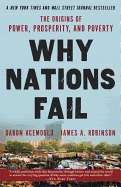James A. Robinson
Mostrando 7 libros encontrados (1 páginas)
1
-
Acemoglu, Daron; Robinson, James A.
Economía versus política
Peligros de las políticas que los economistas aconsejan a los políticos- Página indómita, 2025
Libro encuadernado en tapa blanda · 96 páginas
PVP: 13,50 €
ISBN 978-84-128187-9-6
EAN 9788412818796
Entre los economistas, existe amplio consenso con respecto a que las políticas públicas deben tratar de reducir o eliminar los fallos del mercado. Pero según Acemoglu y Robinson, esta conclusión es a menudo incorrecta, porque ignora la política: las medidas bien intencionadas pueden inclinar aún más la balanza del poder político en favor de los ...
más informaciónDisponibilidad inmediata (en stock)
-
Acemoglu, Daron; Robinson, James A.
The Narrow Corridor
States, Societies, and the Fate of Liberty- Penguin Books Ltd, 2020
Libro encuadernado en tapa blanda · 576 páginas
PVP: 20,20 €
ISBN 978-0-241-31433-3
EAN 9780241314333
As enjoyable as it is thought-provoking' Jared DiamondBy the authors of the international bestseller Why Nations Fail, based on decades of research, this powerful new big-picture framework explains how some countries develop towards and provide liberty while others fall to despotism, anarchy or asphyxiating norms - and explains how liberty can thrive despite new threats. ...
más informaciónSin ejemplares (se puede encargar)
-
- Penguin UK, 2019
Libro encuadernado en tapa blanda · 576 páginas
PVP: 23,00 €
ISBN 978-0-241-31431-9
EAN 9780241314319
'A must-read. Acemoglu and Robinson are intellectual heavyweights of the first rank . .. erudite and fascinating' Paul Collier, Guardian, on Why Nations FailIn this profoundly important follow up to their global bestseller, Acemoglu and Robinson provide a powerful new framework for looking at countries' development through the way that the state interacts with society.This ...
más informaciónSin ejemplares (se puede encargar)
-
Acemoglu, Daron; Robinson, James A.
The Narrow Corridor : States, Societies, and the Fate of Liberty
- Penguin USA, 2019
Libro encuadernado en tapa blanda · 576 páginas
PVP: 19,45 €
ISBN 978-1-984879-18-9
EAN 9781984879189
From the authors of the international bestseller Why Nations Fail, a crucial new big-picture framework that answers the question of how liberty flourishes in some states but falls to authoritarianism or anarchy in others--and explains how it can continue to thrive despite new threats.Liberty is hardly the "natural" order of things. In most places and ...
más informaciónSin ejemplares (se puede encargar)
-
- Crown House Publishing, 2013
Libro encuadernado en tapa blanda · 544 páginas
PVP: 17,85 €
ISBN 978-0-307-71922-5
EAN 9780307719225
economic success (or lack of it). Korea, to take just one of their fascinating examples, is a remarkably homogeneous nation, yet the people of North Korea are among the poorest on earth while their brothers and sisters in South Korea are among the richest. The south forged a society that created incentives, rewarded innovation, and ...
más informaciónPróximamente (avisar cuando esté disponible)
-
Acemoglu, Daron; Robinson, James A.
Why Nations Fail
The Origins of Power, Prosperity and Poverty- Profile Books, 2013
Libro encuadernado en tapa blanda · 464 páginas
PVP: 19,50 €
ISBN 978-1-84668-430-2
EAN 9781846684302
This is a provocative bestseller that explains why the world is divided into nations with wildly differing levels of prosperity. Why are some nations more prosperous than others? "Why Nations Fail" sets out to answer this question, with a compelling and elegantly argued new theory: that it is not down to climate, geography or culture, ...
más informaciónDisponibilidad inmediata (en stock)
-
Acemoglu, Daron; Robinson, James A.
Por qué fracasan los países
Los orígenes del poder, la prosperidad y la pobreza- Deusto, 2012
Libro encuadernado en tapa blanda · 608 páginas
PVP: 29,95 €
ISBN 978-84-234-1266-2
EAN 9788423412662
Nogales (Arizona) y Nogales (Sonora)tienen la misma población, cultura ysituación geográfica. ¿Por qué una es ricay otra pobre? ¿Por qué Botsuana es uno delos países africanos con mayor desarrollo y,en cambio, países vecinos como Zimbabue,Congo o Sierra Leona están sumidos en lamás desesperante pobreza? ¿Por qué Coreadel Norte es uno de los países más pobresdel ...
más informaciónDisponibilidad inmediata (en stock)
1
















